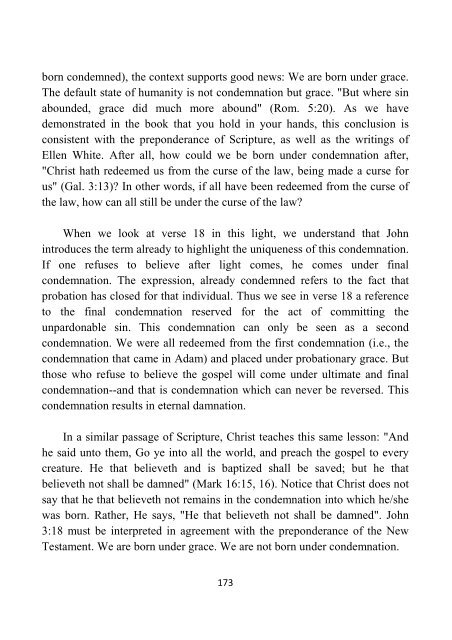Message of the Latter Rain - Kelvin M. Duncan
Create successful ePaper yourself
Turn your PDF publications into a flip-book with our unique Google optimized e-Paper software.
orn condemned), <strong>the</strong> context supports good news: We are born under grace.<br />
The default state <strong>of</strong> humanity is not condemnation but grace. "But where sin<br />
abounded, grace did much more abound" (Rom. 5:20). As we have<br />
demonstrated in <strong>the</strong> book that you hold in your hands, this conclusion is<br />
consistent with <strong>the</strong> preponderance <strong>of</strong> Scripture, as well as <strong>the</strong> writings <strong>of</strong><br />
Ellen White. After all, how could we be born under condemnation after,<br />
"Christ hath redeemed us from <strong>the</strong> curse <strong>of</strong> <strong>the</strong> law, being made a curse for<br />
us" (Gal. 3:13)? In o<strong>the</strong>r words, if all have been redeemed from <strong>the</strong> curse <strong>of</strong><br />
<strong>the</strong> law, how can all still be under <strong>the</strong> curse <strong>of</strong> <strong>the</strong> law?<br />
When we look at verse 18 in this light, we understand that John<br />
introduces <strong>the</strong> term already to highlight <strong>the</strong> uniqueness <strong>of</strong> this condemnation.<br />
If one refuses to believe after light comes, he comes under final<br />
condemnation. The expression, already condemned refers to <strong>the</strong> fact that<br />
probation has closed for that individual. Thus we see in verse 18 a reference<br />
to <strong>the</strong> final condemnation reserved for <strong>the</strong> act <strong>of</strong> committing <strong>the</strong><br />
unpardonable sin. This condemnation can only be seen as a second<br />
condemnation. We were all redeemed from <strong>the</strong> first condemnation (i.e., <strong>the</strong><br />
condemnation that came in Adam) and placed under probationary grace. But<br />
those who refuse to believe <strong>the</strong> gospel will come under ultimate and final<br />
condemnation--and that is condemnation which can never be reversed. This<br />
condemnation results in eternal damnation.<br />
In a similar passage <strong>of</strong> Scripture, Christ teaches this same lesson: "And<br />
he said unto <strong>the</strong>m, Go ye into all <strong>the</strong> world, and preach <strong>the</strong> gospel to every<br />
creature. He that believeth and is baptized shall be saved; but he that<br />
believeth not shall be damned" (Mark 16:15, 16). Notice that Christ does not<br />
say that he that believeth not remains in <strong>the</strong> condemnation into which he/she<br />
was born. Ra<strong>the</strong>r, He says, "He that believeth not shall be damned". John<br />
3:18 must be interpreted in agreement with <strong>the</strong> preponderance <strong>of</strong> <strong>the</strong> New<br />
Testament. We are born under grace. We are not born under condemnation.<br />
173

















